Excerpts From Mike Nifong's State Bar Deposition, Part 2: The Initial Briefing
DIRECT EXAMINATION BY MR. BROCKER:
Q. Okay. All right. And did anything happen -- you said that there was a meeting with the police department sometime shortly thereafter?
.
A. The morning of the 27th, I believe, was when they came to see me, sometime -- and I don't know, it would probably have been after 10:00 o'clock, but I don't know if I -- the first reporter came to see me at 12:45 on that day. So by that time, I had already been -- I had already spoken with Investigator Himan and Sergeant Gottlieb, So it would have been sometime n probably after 10:00 o'clock and before 12:00 o'clock, would be my best guess.Q. So between -- you spoke with them -- you did what I would refer to as the initial briefing or they briefed you on the case initially?
A. Yes, sir.
Q. You think sometime between 10:00 and 12:00 in the morning on the 27th of March?
A. That would be my guess, yes, sir.
Q. And was it just you and Sergeant Gottlieb and Investigator Himan?
A. As far as I recall at this time.
Q. Was that in your office?
A. Yes, sir.
Q. Do you know about how long that meeting lasted?
A. I don't have any specific recollection. I would guess about 20 or 30 minutes. Most of the information that they shared with me at that time was already in the Non-Testimonial Order. There was also an additional -- there was an e-mail that had apparently been sent by one of the lacrosse players to other members of the lacrosse team that had come to the attention of the police department by way of crimestoppers, and I'm pretty sure that that was -- that morning I was told about that e-mail.
Q. That's the Ryan McFayden e-mail?
A. Yes, sir.
Q. What -- prior to going into the meeting with the two investigators, what did you know? Other than what was in the Non-Testimonial Order, was there anything else that you knew?
A. I don't believe so. I just think what was in the Non-Testimonial order is what I knew when I got to the meeting.
Q. You hadn't spoken with any of the other officers involved?
A. No, sir.
Q. Did you have any indication before you walked in that meeting about, beyond what was in the Non-Testimonial Order, what Ms. Mangum had said or alleged?
A No, sir.
Q. Had you seen the statements that had been given by the three residents of 610 Buchanan prior to going into that meeting?
A. No, sir.
Q. Anything besides the NTO as far as documentation that you had going into that meeting?
A. No, sir.
Q. Tell me what was -- tell me what the officers told you -- well, let me back up a second and say. Did you start the meeting by talking to them or did they immediately start briefing you on what was the status of it?
A. I don't recall.
Q. Okay.
A. I mean, I probably said, Gentlemen, you know, gentleman, you know, what's this about? I probably said something along those lines. But, obviously, I had the Non-Testimonial Order so they would have known that I had read that. I don't -- I don't really recall specifics about what was -- what exactly they told me. They did tell me that they had gone to the house for the first time on March the 16th with the search warrant. I believe that's the process or possibly the Non-Testimonial order; but at the time that they did that, that they had, with the assistance of the people in the house, had recovered some property from the - they recovered some nails from the trash can. They told me that they had recovered the victim's cell phone and her purse, make-up kit and one shoe. And what they told me was that the residents of the house had said that they had found that in the yard and that she must have thrown it out the bathroom window. But they looked, and the bathroom window was actually nailed shut. And I also subsequently learned that the officer that had gone to that house had been in the area, had walked through the area where the bathroom window was, and not reported seeing anything on the ground. I was aware that they had made written statements. I don't believe I actually ---
Q. I'm sorry. The residents?
A. I'm sorry, the residents of the house. That would be Matt zash, Dave Evans and Dan Flannery.
Q. All right.
A. And I was aware that they had made statements and that they had listed or given lists of the people that they recalled attending the party, and that all the lists consisted only of Duke lacrosse players. Although we subsequently learned that there were other people that were present, at least part of the time. Those are about the only facts that recall, in addition to the NTO, that I learned on that day.
Q. Okay. Let me -- I'm going to just ask you even though -- just to make sure about a couple of other things. First about the initial meeting and then find out when you learned about those. Let me follow-up. You said that you were aware that they had -- the residents of 610 Buchanan had given statements. Were you actually given statements by the officers on that day?
A. No, sir. I didn't -- I didn't receive any actual documents that day, except for possibly the e-mail itself.
Q. were you aware that they had also agreed -- the three residents had agreed to give DNA samples at that time?
A. I'm not sure that I was actually aware of that at that time. I know that -- certainly, I have learned since that time. I'm aware now that they gave -- they voluntarily gave buccal swabs. I believe they were also included in the Non-Testimonial Order for buccal swabs, and so, I am not sure that I knew that they had actually given or given two samples at that time.
Q. Were you aware that they -- that the residents had denied any kind of sexual assault had occurred on that date?
A. Yes, sir.
Q. And did the officers characterize the cooperation or the lack of cooperation of the three residents during the search warrant and the subsequent statements?
A. You mean, when you say characterize, do you mean did they -- I mean, they told me that they had talked to them. They told me that they had taken them to the bathroom where the stuff was in the trash can. And, of course, they had made written statements that they had. So, it was my impression that the officers did not believe that they had been totally truthful in their responses.
Q. Anything specific about why you thought the officers didn't think they were being truthful?
A. Well, for one thing, the impression that I got from the officers was that they definitely believed that a sexual assault had taken place. That was the -- I believe the -- I didn't really know Investigator Himan at all before this incident. I am not sure that I had actually ever met him. I didn't know Sergeant Gottlieb well. I had seen him on other occasions, had spoken with him on several occasions, actually, but had never worked closely with him in a case, but -- so, I believe for that reason that Mark was probably the one that was doing most of the talking when they were speaking to me because he didn't, you know, we didn't have some prior The one thing that struck us, and I don't know necessarily that it was on this date, but certainly one thing that struck us all early on is - there had been kind of a history of parties in that neighborhood where there was drinking and loud noise, and things like that. There had been a pattern of that during the school year. And one of the things that always occurred was that when the officers responded to the complaints, there would be a lot of people, you know, present and sometimes, you know, some of them would run away when the officers got there. But they would always -- when the officers responded to complaints in that neighborhood about drinking and parties and things of that nature, the parties were always still going on. And one thing that struck me very early on about this, and I believe also struck the officers, was that the response time from when the call came in, the 9-1-1 call came in, in this case until the time the officer got there was less than five minutes. And when the officer arrived, there was nobody in the house. There were no lights on. There was no sign of any activity. There were no people on the street. And I think it struck -- it certainly struck me, and I believe it struck everybody, as very unusual that everybody would have cleared away from that scene so quickly in this case.
Q. In those past situations where the people would have been there when the officers showed up, did those result in some arrests or citations being issued, generally?
A. I think generally, yes, sir. I don't know that all of them did, but usually there would be people who were under age who had been drinking. Sometimes there would be, you know, people throwing stuff in neighbors' yards or there were some, I believe, the occasional communication of threats, things along those lines. But, this is the first such occasion that I was aware of where the officers responded to a complaint and there was nobody there.
Q. In this -- going back to the first meeting on March 27th with the officers, did they discuss with you any inconsistencies in Ms. Mangum's stories or allegations in the initial 24 or 48 hours?
A. I don't believe so. I don't recall any of that.
Q. Were you aware of any inconsistencies at that March 27th meeting in Ms. Mangum's statements initially?
A. I don't believe so,
Q. Did the officers talk to you about their interview of the other dancer who was there with Ms. Magnum, Ms. Pittman?
A. Yes, sir.
Q. What did they tell you about that?
A. It was not on that day that they told me that they believed that she was the one who made the call, but it was -- it was that first week that the investigation was going on, sometime that week of the 27th through the, I guess it would be the 31st, that they were aware that the call that had come in was not -- that was the call referring to, "My friend and I were walking down the street and racial slurs were thrown at us," and they were aware that that was not a kosher call. That is, that, I guess she had told them at some point that she was the one who had made that call, but I did not know that initially the 27th. What I knew that first day was that the two women had gone into the party together. That they had begun to dance, that some people had made some comments that they took as threatening involving doing something with a broomstick. That they had stopped dancing. That they had started to leave and actually left the residence and gone back to the vehicle, and that somebody--I believe it was Mr. Flannery, but I'm not absolutely certain--had come out to try to talk them into returning to the residence to dance. And that at some point during that period of time, Ms. Mangum did go back into the residence. Ms. Pittman did not initially, so they were separated. And that it would have been during that period of time that the assault would have occurred. That the next time that Ms. Pittman saw Ms. Mangum, she -- the way that she described her was different, in a sense that she seemed to be, I don't know if the word would be "impaired," just kind of nonresponsive. We didn't go into all the details about what happened on that night and it's kind of hard for me to remember exactly when I learned some of these facts. obviously, at some point along the way, we know that Ms. Pittman takes her to the Kroger Store and that Ms. Mangum refuses to get out of the car and there's a whole series of things that happened resulting in her going to the Durham Access Center at Duke Hospital. But it's kind of hard for me at this point to separate exactly what date I learned any of the specific facts because I've been dealing with all those things for a long period of time and I just can't recall the exact time I learned any of these things. But I believe that the fact that they had been separated was something that I learned on the 27th or that I knew of that day.
Q. Okay. Do you remember -- let me start with the meeting on the 27th, then the investigators telling you or you becoming aware that Ms. Pittman had referred to Ms, Mangum's allegations about being sexually assaulted as "a crock." Do you remember that coming up?
A. I don't remember it coming up. Obviously, I'm aware that she had at some point said that. I don't recall being aware of that on that date.
Q. And what about her -- you were not given a copy of her written -- Ms. Pittman's written statement on that meeting?
A. I didn't get any of the statements on that particular date.
Q. Were you aware at that meeting that Ms. Pittman had claimed that when Ms. Mangum came back out to the car for a second time, according to Ms. Pittman, Ms. Mangum wanted to go back in and make more money?
A. I don't recall having been aware of that at that time.
Q. Do you recall when you would have become aware of those facts about what Ms. Pittman was claiming happened?
A. Not specifically. There were a number of things that -- Ms. Pittman was also making some inconsistent statements, I guess would be the -- and so I was aware that she had told them some of these things at some point during the investigation, but this was -my initial attempt was not to prepare the case for prosecution, but to learn as much as I could about the case because I knew that I was going to be asked questions just because of the fact that anything involving -- anything that occurs in Durham that involves a Duke team and criminal charges is going to get some attention.
Q. Did you talk at all during that meeting about the prior photo arrays that had been done with Ms. Mangum before the 27th?
A. No, sir. I did at some point subsequently learn that they had attempted to do photo arrays and that some of the things that they had run into with that wouldn't have been at that meeting.
Q. And you said that the officers did not have any documentation with the possible exception of the e-mail from, Mr. McFayden's e-mail, that they gave you on that meeting?
A. That's the only thing I remember them giving me.
Q. Anything else you can remember, other than what we discussed, in talking to you about on the 27th?
A. No, sir.
Q. What, if any, comments did you make during the meeting after they -- either while or after they had told you what had happened?
A. I don't recall any comments. I would imagine that at some point I would've -- I might have asked a question either interrupting them or they were telling me something, if they asked a question about something that I might not have understood, or to ask about something, but I don't remember any specific questions I might have asked.
Q. Do you remember making any comments about the case or the investigation or anything else?
A. No, sir, not at that time.
Q. I'm going to have to use his language because it's exact. But in -- do you remember making a comment in that meeting to the effect in talking about this case and what had happened up to this point, I think the exact quote was, "We're fucked"?
A. No, sir. I actually am aware -- well, let me say this I don't recall ever making that statement, but on the other -- at the same time, would say that it's not a statement that I can have tell you that I wouldn't have made. I mean, it certainly is possible that I said something. But my -- my recollection is that that statement would have been made at a later time and in reference to some things that had been written by - had been put in a report by another officer. Some things had been stated by another officer, specifically, Officer Shelton, who was the first officer who arrived on the scene at the Kroger, did not believe that anything had occurred other than it was a drunk victim, and she did not -- I believe -- as my recollection is, that she didn't make any statements about having been sexually assaulted at the time she spoke with him. That subject came up at the Durham Access Center. So he thought he was dealing with someone who was impaired and uncooperative, and that that was all he was dealing with. And he made some statements publicly later on to other members of the police department, and some of those statements at some point got into -- was asked about them by sources outside, and, you know, I might very well have said, and this is the kind of stuff that, you now, really screws up or fucks up an investigation. And, you know, this is -- this is not something that he should be saying.
Q. So if you made a comment or a similar comment, it would have been about what was in Shelton's report and comments that he made?
A. I think it would have probably been before I even saw his report, but just based on what heard that he was saying, that he was making comments publicly within the department that there was nothing to this. So he was, to my knowledge, the only officer who had reached that conclusion.
Q. Do you recall any general time frame for when he was making those comments or when you were asked about them?
A. No, sir. I mean, it would have been fairly early on, but probably not even the first week.
Q. Can you explain what you -- what you -- if you made that kind of a comment, can you explain what you meant by it?
A. Well, I'd actually tried a case that -- I mean, you brought up Mary Winstead. I tried a case one time that had been hers before she left the DA's office, and it was a situation where we had an officer who had arrived at the scene of a reported rape, and he did not believe the victim. And as a result of having not believed the victim, there were many things that he did not do that he could have done that, you know, later on we couldn't do, and it really damaged the case when that occurred. And so, I was aware that the attitude of the initial officer on the scene could make a tremendous difference in a sexual assault case because I had seen that. And that was a case that we tried and there ended up being a verdict of not guilty in that case that had been, I'm trying to remember, it was probably sometime around '95 or '96 when I tried that case.
Q. Okay. And so, with that knowledge, what did you -- what was your intent if you made that kind of a statement?
A. Well, the statement would have just been made to the officers, and I'm not sure that there was any specific intent other than to let them know that that was the kind of thing that was very damaging to a case. We were still involved in the investigation.
Q. Did you on the 27th form any opinion about the strength of, I mean, charges that might be brought against potential defendants?
A. On the 27th, we didn't even have anysuspects. We -- I did not know, I mean, my belief was that a sexual assault had taken place in the bathroom based on what had been told to me by the officers and based on the, you know, what had been reported by the SANE nurse and there was not -- there didn't seem to be any -- any point raised by any of the officers that, you know, something didn't add up about this. Sometimes you have that situation where an officer will express reservations about what a witness has said, and that's an indication that you need to look into that a little further. I never got any of that in this particular case. So I believed that a sexual assault had taken place. I wasn't sure exactly what the nature of the sexual assault was, and I had no way of determining who might have been involved. Just that it took place in the context of a party at that house.
Q. Well, wouldn't it be fair that if it did occur, that it would have -- from the information at that time, youhad reasonable cause to believe that it was one of the Caucasian lacrosse players?
A. A Caucasian certainly, but I don't know that it would be fair to say that we had reached any conclusions about whether or not it was a lacrosse player. If -- I mean, there's no way -- we did not believe that the young men who lived in the house had been completely straightforward about what they told the police in the first part. So, certainly if all the people that they reported were lacrosse players and that none of the lacrosse players were involved in the assault, that could have just meant they weren't telling us who the people were who were in the bathroom with the victim. I had no idea. I didn't know any of the people who were involved, but I had no presupposition that any particular person was involved at that time because we didn't have any evidence against anybody. We knew that there was somebody who was at this house that she said came into the bathroom with her, but we didn't know who the lacrosse players were.
Q. But you would have had to have -- your office would have had to have reasonable cause to believe that it may have been one of the lacrosse players to the Non-Testimonial order?
A. May have been, and I believe that's what the Non-Testimonial says. It indicates that the people who were at the party reported that everyone who was at the party was a lacrosse player. And so, therefore, if there was an assault, and if all of the people there were lacrosse players, it would be logical to assume that the assailants were lacrosse players. But I didn't -- I wouldn't have necessarily written the Non-Testimonial exactly the way it was written. For one thing, I would probably have never put in a Non-Testimonial the language about the results will identify the person who was responsible because my experience is that that doesn't always happen. And that was another reason -- I mean, I don't know that Mr. Saacks had ever dealt with a rape case. And he's a very bright man. He's a wonderful Chief Assistant, but I'm not sure that that language would have been language that I would have allowed to remain in a Non-Testimonial.
Q. All right. I want to go back. Anything else that you recall about the March 27th initial briefing meeting?
A. Not right offhand.
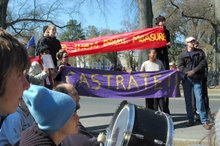




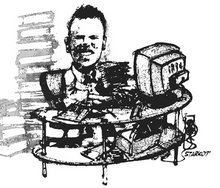
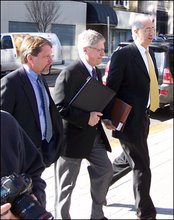
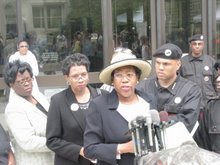
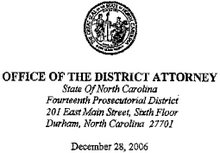
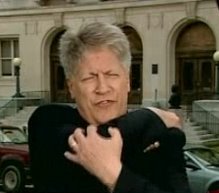

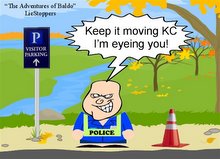

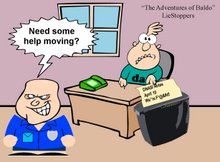

















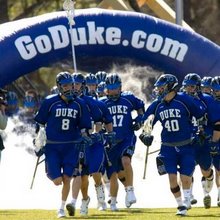

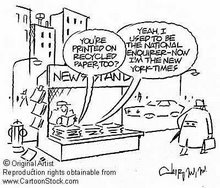

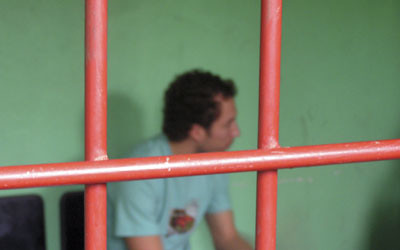



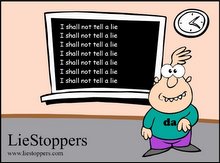






1 comment:
"But, obviously, I had the Non-Testimonial Order so they would have known that I had read that."
Given the large number of critical documents which Nifong admits having turned over to the defense but now wants us to believe that he hadn't actually read, I found the above line quite amusing...
Post a Comment